Also do not miss a little cake called “nem chua chợ Huyện” a kind of sour pork cake, and one of the dishes that creates typical features of Binh Dinh province.
From the central of the town go along the national road number 19 for about 3 km and you will arrive at the Town market. It is in Vinh Thanh village, Phuoc Loc, Tuy Phuoc, Binh Dinh province. As with any other market in the Central region, life is always very hard for everyone living there. However it is also a place where many famous people were born, such as Poet Xuan Dieu, Dao Tan. Also born here were many popular dishes such as rice noodle soup with fish or “nem chợ Huyện”, sour pork cake.
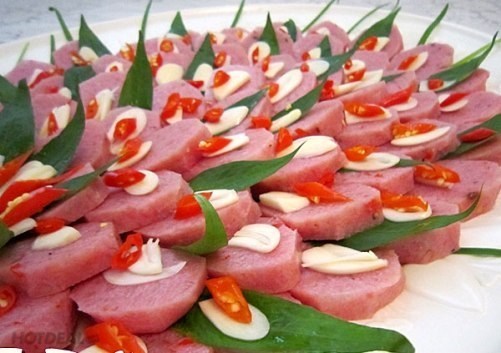
“Nem chợ Huyện” is produced in Tuy Phuoc a place near Chợ Huyện, which means town market and it was named after this. “Nem chợ Huyện” has all the elements of salt, sweetness, firmness, fat and crispness. The dish is common as a daily meal as well as on special occasions, like weddings or feasts. “Nem chua” is considered as a specialty of Binh Dinh province:
Anyone coming to Binh Phuoc to try “nem chua”
Please don’t forget to stop by Hung Thanh to see the Cham Tower
This dish is also a favorite that is normally served at overnight folk operas.
“Nem chợ Huyện” is made from 5 to 8 month old wild pork weighing about 60kg, this has more meat than fat. About 15kg of meat is taken from 4 pork thighs. If you want the “nem” to taste really good you have to take the meat immediately after the pig is slaughtered, thus being very fresh. The meat must still be warm and dark red. Clean the fat and the layer around the fat before using a clean piece of fabric to dry the meat. This is then cut into small piece and mashed until it becomes completely minced pork, normally this takes about 30 minutes.

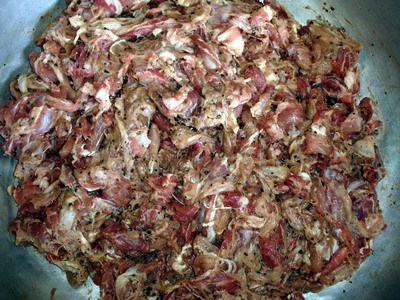
The mashed pork is better if you use a millstone made in the Quang area, because these have a smooth surface and are deep. The best millstone should be made from the stone taken from the Non Nuoc Mountain in Danang, these are black in color as well as being very smooth. When you mash the pork you have to maintain the same pressure from your hands and work constantly. If you get tired you must get someone else to continue immediately.
As one person mashes the pork and second should support by adding sugar and salt following accepted proportions. Work continuously until the meat is done; continue to add pepper, peeled and sliced garlic, a little bit of cooked fish sauce and pork cleaned julienned skin cut into diamonds. Normally a man will be in charge of mashing the pork as it takes a lot of strength..

There are two kinds “nem”, fresh and sour. After the pork is mashed and seasoned it is shaped into a ball. They are served on wooden skewers, ten to each skewer. They are grilled on a coal stove, not too hot, and turned regularly, lightly adding oil. This how they should be prepared and served.
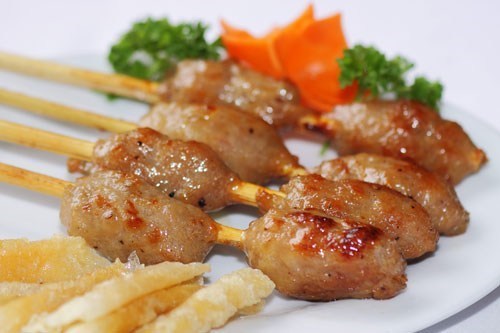
When they are cooked they provide a lovely aroma, as they are served with coriander, perilla, sliced banana, sliced star fruits, sliced cucumber, peeled and sliced garlic, and chili dipped with soya sauce with added ground peanuts, sugar, garlic and chili. Sour “nem” is minced pork formed as a small cylindrical shape about as big as a spring roll, then wrapped in guava leaves or Phrynium placentarium leaves before a final layer of banana leaves.
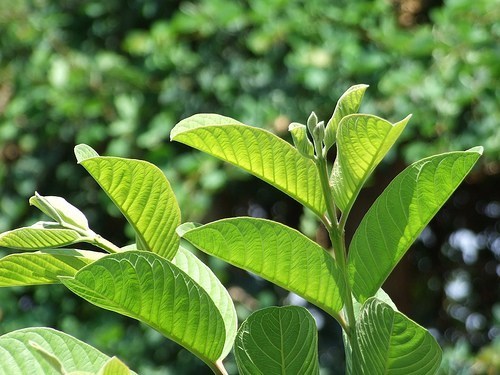
In order to give the “nem” the sweet and sourness, firmness and crispness, it needs to be kept one day after grinding to absorb all the spices. If you want the “nem” to become sour quicker, simply add more garlic and spice. On the other hand, if you want the “nem” to be better preserved, add less spices. When wrapping the minced pork it is necessary to use guava’s leaves, which will keep the pork drier. Then wrap it in use a plastic to prevent it going moldy. Usually “nem” is made in 20 pieces for one package, tied and hung in a dried and cool place.
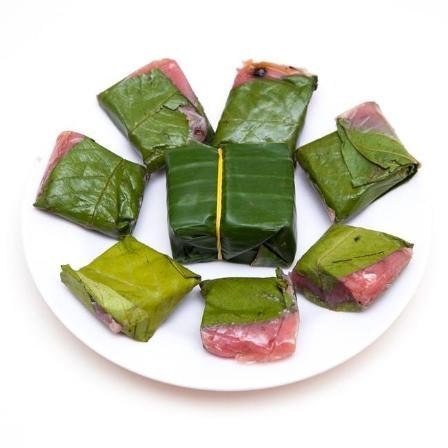
In the dry season” nem chua” needs 4 to 5 days after wrapping to be ready. It will have a fresh pink color, be firm and crispy and taste a little bit sour and sweet with the spiciness of the pepper and garlic, and a little bit acrid from guava leaves whilst retaining the crisp of the pork skin.
“Nem chua” is served with soya sauce or fish sauce, –Go Boi’s specialty, mixed with chili sauce with garlic and green chili. Normally men like to have “nem chua” with Bau Da whisky as the song lyric goes “Bau Da whisky is delicious with “nem chua” from Town market, nobody can walk away”. Have a drink with “nem chua” and forget your way home.

In the Hanh Quang village in Tuy Phuoc, Binh Dinh province, there is a person named Mrs Dao Thi Quyen , she is about 70 years old. She is the owner of the Bay Liem shop which was transferred from her husband’s family more than hundred years ago. This traditional dish started in her grandfather’s time and is very famous in the Town market, and at that time its brand was Bay U. When Mrs Quyen continued this business she changed to Bay Liem, her husband’s name and became memorable in Binh Dinh province. When people talk about “nem chua” they always mention the Bay U shop.
She sells more than hundred kg of “nem” per day. All her ten children follow this traditional family business. Besides “Bảy Ù” shop there are other famous brand selling “nem”, such as “Năm Thu”, “Bốn Lai”, and “Bốn Tạo”. The nem from Town market isn’t only sold within Binh Dinh province but also delivered to Quang Ngai, Da Nang, Gia Lai, Khanh Hoa and Saigon. It is also available in big supermarkets in Quy Nhon and Quang Ngai.
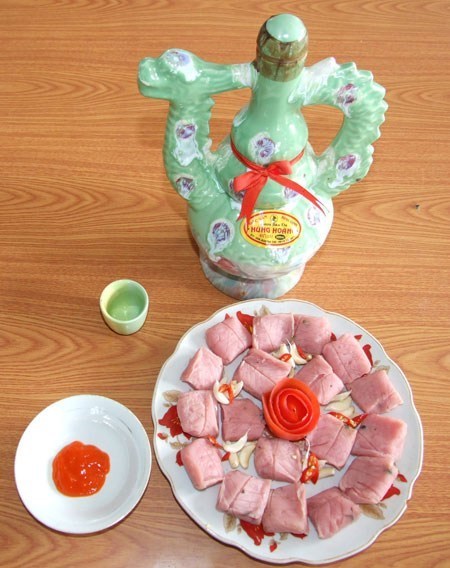
There are specialties that now only remain as memories but “nem chợ Huyện” not only remains but have developed more than ever. If you go to Bàn Đồ town to see the Cham tower, try a bowl of rice noodle soup and enjoy “Bánh ít lá gai” for dessert, it’s a kind of sticky rice cake with a green bean filling. Also do not miss a little cake called “nem chua chợ Huyện” a kind of sour pork cake, and one of the dishes that creates typical features of Binh Dinh province.
Try“nem chua” and before you even leave, it will become a memory that you won’t ever forget.
Followed V.H
Dan tri
Extracted from articles written especially for Golden Spoon 2014 called “A journey of searching traditional rustic dishes”